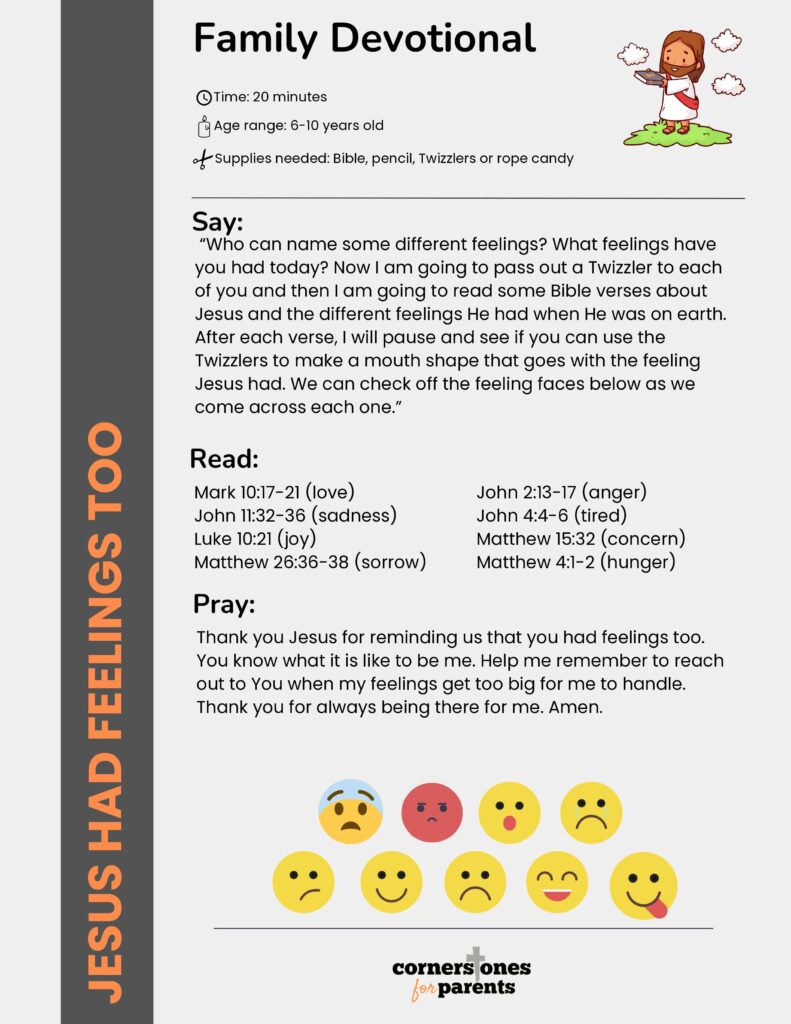We are living in an age of increasing emotional intelligence. This is a wonderful thing because studies have shown that we can decrease the activity in the threat center of our brain by simply naming the feeling we are having. When we teach children a wide variety of feelings words and use them in day-to-day life, we provide them with a wonderful opportunity to better observe and understand their inner experiences.
However, many of us have adopted the idea that there are two types of feelings: “good” feelings (happy, excited, calm, peaceful) and “bad” feelings (angry, annoyed, hyper, scared). When we enter into this dichotomy, we can set ourselves (and our kids) up to seek after certain feelings and avoid others. This can create a war within ourselves as we fight with some emotions and idolize others.
So let’s look at feelings through the lens of Scripture. And where better to start than with the life of Christ.
The devotional that follows can be used with kids ages 6 to 10, but feel free to adapt the language to fit your family.
Devotional for kids about feelings
Starter questions:
- How many feelings words can you name?
- How many of those feelings have you had today?
- What are you feeling right now?
- How do you know what you are feeling inside?
- How might other people know what you are feeling?
Did you know that Jesus had feelings too? Today we are going to look at some places in the Bible that tell us that Jesus had feelings just like us and because Jesus was perfect, that must mean that all feelings are ok.
Click the button (or image) below for a printable pdf of this family devotional.
Take it further
Once kids grasp the fact that all feelings are okay to feel and that Jesus felt them too, we can start to help our kids connect the dots between feelings and behaviors. Feelings often precede behaviors. (Please note that neurodiversity can impact a child’s ability to make a “front brain” (ie cognizant) choice in the face of strong emotions and will take more training and practice than what is outlined here.)
If your child is struggling with anger and lashing out, you could say something like, “It is okay to be mad, but it is not okay to hit your sister.” Then you can follow up with a linked consequence to the behavior (such as making amends to their sister in some way). You can also help them (when their thinking brain is back online) figure out the tools they would like to practice in preparation for next time (and there will be a next time!).
Or if your child is struggling with anxiety and it is showing up in avoidance of activities, you can say something like, “Being nervous is okay. Everyone feels that way sometimes.” or “Worries often point out what is important to us. What do you think your worries want you to know?” or “What do you think you miss out on when the worries take over?” Helping your child view their feelings as something that gives them information, rather than something to be avoided can be very helpful in developing emotional intelligence.
Jesus had the full width and breadth of the human experience (Hebrews 4:15). When we can befriend our inner experiences and make peace with the feelings we have, we can be free to live out the path God has for us, even if uncomfortable feelings tag along. Let’s teach our kids the same.




Leave a Comment